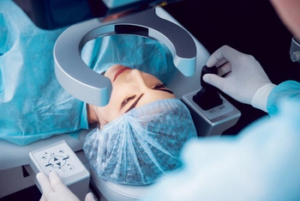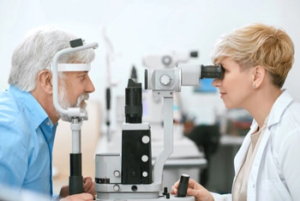Understanding the Age for Laser Eye Surgery: What to Know
One frequently discussed factor when considering laser eye surgery is age. The age for laser eye surgery can influence eligibility, recovery, and long-term results. Understanding how age affects the eyes, prescription stability, and overall eye health helps you make an informed decision.
This article provides an overview of how age interacts with other factors when considering laser eye surgery.
It aims to help patients understand what to expect, what criteria are considered, and how different age ranges relate to eye development and long-term vision outcomes.
The Purpose of Laser Eye Surgery
Laser eye surgery is a medical surgery designed to correct refractive errors by adjusting the shape of the cornea. This can help reduce the need for glasses or contact lenses and improve clarity of vision. Some forms of laser vision correction include LASIK eye surgery, SMILE®, PRK, and PRESBYOND® Laser Blended Vision.
Why Age Matters in Eye Surgery
Age influences the eye’s ability to heal, maintain a stable vision prescription, and adapt to changes in focus. The age for laser eye surgery is important because the eyes continue to develop and stabilise over time, and certain age-related changes can affect eligibility.
Minimum Age for Laser Eye Surgery

This stability is key because performing laser eye surgery before your prescription has stabilised may result in the need for future adjustments. Eye specialists assess your past year of vision data to determine consistency.
When Younger Eyes May Not Yet Be Ready
Teenagers and young adults often experience ongoing changes in their vision prescription. For this reason, they may not be suitable for undergoing laser eye surgery until the eyes have stabilised. The minimum age requirement protects long-term eye health and ensures reliable outcomes.
Evaluating Maturity and Responsibility
Age also relates to decision-making maturity. Understanding the potential risks, realistic expectations, and recovery process requires careful thought. Surgeons ensure that younger candidates demonstrate the responsibility needed to follow post-surgery care guidelines.
Typical Age Range for Laser Eye Surgery
While there is no fixed age limit, people may seek laser eye treatments during adulthood when prescriptions are steady. The age for laser eye treatment depends on individual eye health, medical history, and readiness for a medical procedure.
Assessing Candidacy Beyond Age
Being a potential candidate for laser eye surgery involves more than meeting the minimum age. Your corneal thickness, eye health, and medical history play major roles in eligibility. A comprehensive assessment ensures that every factor is carefully considered.
The Role of Hormonal Changes
Hormonal changes can affect vision and the eye’s ability to stabilise. For instance, pregnancy or certain medications may temporarily alter vision prescription. In such cases, surgeons often recommend waiting until the eyes return to a consistent state before laser vision correction.
Maintaining Healthy Eyes Across Different Ages
No matter the age group, keeping healthy eyes is vital. Regular check-ups with an eye doctor help monitor vision changes, detect eye diseases, and assess whether you remain a good candidate for laser eye surgery or other vision correction procedures.
Understanding Corrective Surgery Options
Corrective surgery for vision correction includes several laser eye surgery options, each designed to address specific visual needs and eye characteristics. Common procedures include LASIK surgery, PRK, SMILE, and PRESBYOND for age-related near vision concerns.

For instance, LASIK surgery involves creating a flap on the cornea using a femtosecond laser, then reshaping the inner layers to improve the eye’s focusing ability.
PRK, on the other hand, removes the outermost corneal layer without creating a flap, making it an option for individuals with thin corneas.
SMILE uses a small incision to remove a lenticule of tissue, maintaining greater structural integrity of the cornea.
For those experiencing changes in near vision due to ageing, PRESBYOND combines laser reshaping with a profile that extends the eye’s depth of focus, helping to reduce reliance on reading glasses.
Post-Procedure Adjustments
After surgery, your eyes undergo a natural adaptation period as they heal and stabilise. This adjustment phase can vary between individuals depending on factors such as age, corneal thickness, and the type of laser eye surgery performed.
During the first few weeks, you should notice gradual improvements in vision clarity as the corneal tissue settles into its new shape. Some temporary visual fluctuations, such as mild blurry vision or sensitivity to light, can occur as part of the healing response.
Your eye doctor will schedule several follow-up appointments to assess the stability of your vision prescription and ensure your eye health remains consistent. These reviews help identify whether both eyes are healing evenly and whether any adjustments to your treatment plan or visual care routine are needed.
Protective measures, such as avoiding eye rubbing, using prescribed eye drops, and wearing protective eyewear during recovery, support healing and help maintain corneal integrity.
Regular check-ins allow your eye specialist to confirm that your vision continues to stabilise as expected and that your eyes are adapting appropriately to the corneal changes introduced during the surgery.
Understanding Potential Risks
As with any medical procedure, laser eye surgery involves certain potential risks that should be carefully considered.
Some potential risks and considerations may include:
- Temporary Discomfort: Mild irritation, a sensation of dryness, or light sensitivity can occur as the eyes heal.
- Fluctuating Vision: Some individuals may notice brief periods of blurry vision or changes in clarity during the recovery process.
- Dry Eyes: A temporary reduction in tear production may lead to dryness, which may improve with prescribed eye drops and time.
- Night Vision Changes: Light sensitivity or halos around lights may occur in some cases during early recovery.
- Corneal Thickness Concerns: Those with thin corneas or irregular underlying corneal tissue may be at higher risk of structural irregularities.
- Infection or Inflammation: Any surgery carries a risk of infection, which may be managed with close post-procedure monitoring.
- Residual Refractive Error: Some people may still require glasses or contact lenses for certain tasks, especially if the vision prescription changes later in life.
Because each person’s eyes differ, eye doctors perform an assessment before recommending laser surgery. This includes evaluating corneal thickness, ocular health, and overall health.
When to Reassess Vision After Surgery
Over the years, it’s normal to reassess your vision. Changes in natural lens flexibility or ocular health may call for additional adjustments. Your surgeon will guide you on whether other vision correction procedures are recommended.
Frequently Asked Questions
Can older adults get laser eye surgery?
Yes, older adults can have laser eye surgery, provided they meet the eligibility criteria. However, if age-related lens changes or cataracts are present, lens-based surgery or refractive lens exchange may be recommended instead.
What if my prescription still changes?
Waiting is recommended if your vision prescription has changed within the past year. Once stable vision has been confirmed, laser eye surgery is typically performed.
How do I prepare for the procedure?
Patients are usually advised to stop wearing contact lenses for a set period before surgery, avoid using makeup or creams near the eyes on the day of the procedure, and arrange transport home after the procedure.
Conclusion
Age plays a role in determining eligibility for laser eye surgery. The age depends on having stable vision, maintaining healthy eyes, and whether the underlying tissue can support the procedure.

Whether you’re exploring laser eye treatment for the first time or considering it later in life, understanding how age influences outcomes helps you choose your vision correction.
For more information about laser eye surgery in Melbourne or to determine if you are a potential candidate, contact Armadale Eye Clinic at (03) 9070 5753 to arrange a professional assessment.
Note: Any surgical or invasive procedure carries risks. Before proceeding, you should seek a second opinion from an appropriately qualified health practitioner.
References:
Caceres, V. (2025, June 30). How to Tell If Laser Eye Surgery Is Right for You. Verywell Health. Retrieved October 13, 2025, from https://www.verywellhealth.com/laser-eye-surgery-8678350
Felman, A. (2024, August 12). What To Know About Laser Blended Vision. Medical News Today. Retrieved October 13, 2025, from https://www.medicalnewstoday.com/articles/blended-vision-problems
Silver, N. (2025, April 7). What Causes Dry Eyes After LASIK Surgery, and How to Treat Them. Healthline. Retrieved October 13, 2025, from https://www.healthline.com/health/dry-eye/dry-eyes-after-lasik










Leave a Reply
Want to join the discussion?Feel free to contribute!